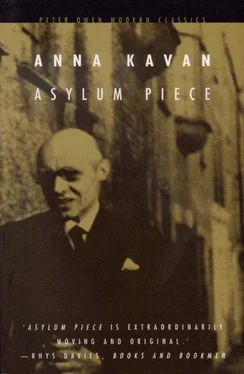Now they are in a bedroom. The nurse goes in search of the luggage. The other woman, her last physical force depleted by the recent exertion, droops on the edge of the bed, less than half present: only a kind of mechanical masochism still keeps her upright. Her companion, without knowing why, is irritated by this posture.
‘Why don’t you lie down comfortably?’ he asks her, repressing annoyance and keeping his voice low.
She does not answer, but something — perhaps it is the sight of the white clouds that now, like choir-boys, like seraphs, are moving across the sky in ordered procession — moves her to take his hand.
‘I’ll get better now… Everything will be all right, won’t it?’ she says, incoherent, seeking from him some reassurance which is not in his power to give.
He stirs awkwardly, scowling and biting the nails of his free hand.
‘Yes… of course… you’ll get better…’ He only wants to be free, to be gone — anywhere, out of this situation so intolerable to his irresponsible heart. But suddenly he bends down and kisses her on the cheek. She is surprised out of her trance, touched, grateful, encouraged; for a second she feels almost her old self. Even now, at the last moment, she will save everything; she will walk, and they will go out together into the sun. She starts to speak, to stand up, but he disengages himself and goes to the door.
‘You’re going away?’ she asks, disappointed. He mutters something, looking aside. ‘But you’ll come back soon?’
‘Yes, of course. When you’re in bed.’
He goes out of the room. She sits on the edge of the bed, suspended, almost lifeless, the brief animation, departed, leaving her emptier than before.
All at once she hears the engine of a car being started outside. From where she is sitting she can see through the window, covered with iron scrolls, a sweep of the drive where a car is beginning to move. Her eyes recognize that it is the car in which they drove from the town, but her brain draws no conclusion from this. Suddenly she sees in the back seat the man who accompanied her. But even now she feels only bewilderment, stupefaction. What does it mean? Why is he in the car? His suitcase lies on the seat at his side, and for some reason the sight of this bag, which she herself gave him years before, convinces her of the truth.
‘He’s leaving me here. He’s going away… Without telling me… Without even a word. When he kissed me it was good-bye.’
Some final desperate reserve of nervous energy enables her to run to the door. ‘I must go to him — I must stop him — he can’t leave me like this!’ she cries out to the empty room. The door is locked on the outside. She twists the handle and beats on the glass panel. The glass is unbreakable and an iron bar would do no more than splinter it. Nevertheless she continues to beat weakly upon it with her two hands while tears run down her distorted face.
An attendant passing along the corridor glances with a startled look at the convulsed face with its wild, lost, streaming eyes, and then hurries off in search of someone in authority.
It is early in the morning in one of the bedrooms of the foreign clinic. The empty room has the indefinably forlorn air of a place just deserted by its usual occupant. The door into the passage stands open, there is a tray with disarranged breakfast things on a table beside the bed. The room is quite large and has a parquet floor and well-proportioned furniture of pale wood: although one would not call it luxurious, it is certainly comfortable and pleasant. All the same, there is something a little odd, a little disquieting, about it. It would be difficult to locate the source of this impression; perhaps the circumstance that there is not a single hook anywhere, that all planes are bare and smooth, and that the electric light is protected by a wire screen, has something to do with it. The big window, too, is covered by a grille of wrought iron work which, though it is ornamental, somehow suggests a utilitarian purpose. Just now the room is cool, even chilly, in spite of the fact that it is midsummer. There is a thick white mountain mist out of doors.
A young peasant girl in an overall hurries in from the passage, carries away the breakfast tray, and then returns with an armful of cleaning utensils. She is nineteen or twenty years old, big, robust, rather bony, with an unbeautiful large-nosed face and brown hair scraped back from her forehead. All her movements are clumsy but vigorous. She kneels down on the floor, scoops a dollop of some thick, grease-like substance out of a tin, and begins to polish the boards energetically. As she works she quietly hums to herself a long, tuneless national song. All her life she has worked hard, she is full of unbounded energy, it pleases her to see the smooth wood shine like water under her cloth; she is happy.
Soon the floor is polished as if for a ball, but still there is the bed to make, the furniture to attend to. She washes her hands at the basin and dries them on her special cloth before putting the bed in order: then goes over to dust the dressing-table, looking with unenvious curiosity at the decorative boxes of powder and cream, the scent in its slender flask.
Before she has finished, the occupant of the room returns from her bath. She is about ten years older than the peasant girl, of whom she is the antithesis in every way; the two might serve as examples of opposite products of society. The newcomer is exceedingly slim and decorative in a sophisticated way. Her long, smoothly curving, heavy blonde hair, her full cyclamen-coloured gown that trails on the floor, give her a somewhat romantic appearance which is not negatived by her unhappy eyes, nor by her face of assumed hardness, of assumed indifference, which does not conceal desolation.
She says good morning, then carelessly drops on the bed the sponge, the soap, the essence which she has brought back from the bath, and goes to the window where she stands staring out at the mist that hides everything behind its sad, opaque, colourless veil. The peasant girl hurries to pick up the things from the bed and arranges them carefully in their proper places. As she finishes her work she glances all the time at the other woman who stands there so still, looking away from her, as if in another world. The graceful cyclamen robe fills the beholder with admiration. ‘How wonderful it must be to wear such a dress,’ she thinks in her simple heart. ‘She looks like an angel with her hair hanging down so bright’: and she touches her own drab head with a sort of surprise.
‘The room is done now,’ she says at length, timidly, in the bad French which she speaks only with difficulty.
The woman in front of the window makes no reply, no movement at all. Perhaps she has not understood, perhaps she has not heard.
The other takes out her brooms, her cloths, her polish, and puts everything down in the corridor. Then she goes back and loiters a moment or two inside the bedroom door. She knows she ought to get on with her work, to hurry into the next room and start polishing the floor there, instead of wasting her time; but somehow she cannot bear to go away without some response from that motionless figure whose hands are now clutching the scrolls of the iron grille.
‘Don’t stand there, madame,’ she says in her awkward way; ‘madame will catch cold — let me dose the window.’ She crosses the room and actually reaches towards the glass, brushing the other’s sleeve as she does so. The physical touch breaks the spell of the elder woman’s abstraction and she turns her head. The servant is horrified to see her eyes overflowing with tears which slowly and without any concealment run down her cheeks.
‘Oh, madame…’ she stammers, ‘what is it…? Don’t cry…’
Читать дальше












